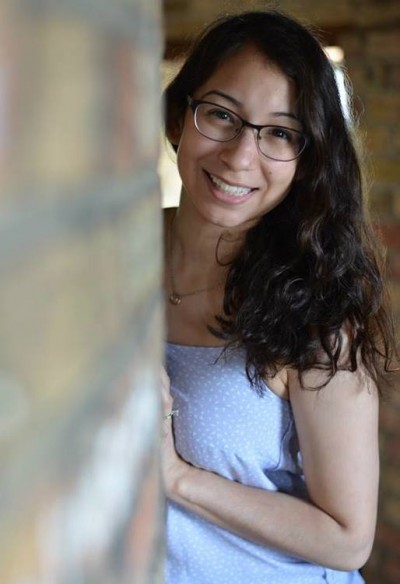The notion that fusion and exchange (of culture, of ideas) will result in evolution is central to Amanda Huynh’s poetry. This Texas native nursed a love of writing while earning an undergraduate degree in Biology at the University of Texas at Dallas. Huynh is currently earning an MFA in Creative Writing at Old Dominion University, where she insists that her biology degree has played an important role in shaping the dialogue of her poetry. Her chapbook ‘The First Language’ was a finalist for this year’s Anzaldúa Poetry Prize.
her biology degree has played an important role in shaping the dialogue of her poetry. Her chapbook ‘The First Language’ was a finalist for this year’s Anzaldúa Poetry Prize.
Readers encounter the medical terminology Huynh once studied in poems like ‘The Translation. Further reading of Huynh’s work reveals another layer: poems like ‘Tết’ ruminate on the loss of loved ones, extending to loss of language or cultural ties.
The interplay between these themes–the medical world, the author’s cultural background–make Huynh’s chapbook ‘The First Language’ feel alive and fresh.
Fake hearts if mechanically activated
ba-dum on a machine-measured beat
Beating to stay alive Beating to stay alive
Surgery requires an incision
below the collarbone
A small metal tentacle fed into a superior vena cava
A flat egg shaped pacemaker to push against
skin like a subtle speed bump in the road
The one that catches you off guard during a night drive
The one that catches your first lover off guard
when he rubs his hand across your chest
pulls away finds the light
and avoids your childhood scar
– Amanda Huynh
Taeler Kallmerten: When did you start writing poetry? Why did you choose to write poetry?
Amanda Huynh: I did not start off pursuing poetry. Writing was something I did on the side, and I was pushed to go into science. My first bachelor’s degree was in biology, and I minored in creative writing. The writing impulse was present the entire time. I still remember someone telling me, “You’ve majored in rationality, and minored in your passion.” After graduation, I got a full-time job in the medical field, and I could have stopped at an eight-to-five job. However, that lifestyle did not fit me well. It was not long before I went back to school to get my second degree in English. This time, I was serious about pursuing a writing life.
The time I spent completing my English degree was one of the most pivotal points for me. I had two wonderful professors, Laura Kopchick and Tim Richardson, who really opened everything up for me. This was also the time when I had committed to a genre. It all happened during an advanced poetry workshop. I had just finished writing a poem, “My Nervous System,” about a narrator seeing a crush and how her nervous system is reacting. My poem was being critiqued, and I realized all the possibilities in poetry. I knew that this was what I was going to pursue. This was also the first time I was actually really proud of something I created. It is such a nerdy poem, but I still find it one of my favorites to read.
Kallmerten: You said you were born in Texas. How has Texas inspired and shaped your writing?
Huynh: Yes, I am a native Texan—the old born and raised. I never lived outside of Texas until I moved to Virginia in 2014. I mention this because it changed my perspective about home. When you live somewhere, you don’t really notice the distinct characteristics around you.
When I moved, I was able to see Texas through a new lens. There’s a large Latino population in Texas alone, and an even greater diversity. It’s not as common in Virginia. The absence of this has found its way into my work. Before I moved, I rarely wrote about family: our Latino perspective, work struggles, identity, working as migrants, what it means to be Latina, what it means to be Latino, and more. It is more prominent in my work than it’s ever been, and I believe it has a lot to do with being fourteen hundred miles away from home.
Kallmerten: Can you describe your writing process, and share any advice you’ve been given by other poets?
Huynh: The writing process varies from one poet to the next. For a while I thought my writing process was terrible until I heard a craft talk on revision by Cornelius Eady. He described how there is no one correct way to write, and that for many people it can be vastly different. The biggest point I took away was that revision will always be a part of the writing process, and as he put it, “You better make your peace with it.”
In my writing, I tend to sit with an idea and meditate on it. It might take a few minutes or a few months, and it all depends on what the topic is. If the topic has something to do with current events, I will do some research. I do not start writing until I have a firm grip on the first couple of lines. When I do, I write it out by hand, edit, rewrite, and repeat. It doesn’t become a draft until I type it into a Word Document. At that phase, it becomes a revision game and I begin to save all the versions.
“to pray in a language
I don’t understand,
a language my throat
cannot wrap around
– Amanda Huynh
Kallmerten: Your poetry illuminates a struggle to preserve your culture. You write “It occurs to you/ that only in America will you lose/ abuelo.” Can you describe why you think this happens? And how it has impacted you?
Huynh: The dilution of language, yes. The loss of a family member, yes. When someone passes away, you are not just losing a loved one—you are losing a connection to your culture, a mind, an experience of the world during a specific time, and a speaker of your own language.
My mother lost her mother at the age of sixteen. Since then, she didn’t feel compelled to speak Spanish. I’ve never asked my mother why, but I’ve concluded that it’s because it brings painful memories of a time that’s now gone. The only time Spanish is spoken tends to be around family, and we live far from family.
My parents moved away because of work—the working culture in America pushes people to be workaholics. When we moved from Abilene to Houston, I was five. In those first five years I remember my aunts and uncles coming over all the time, there were always cousins to play with, trips to Floydada (where my grandparents lived) were frequent, Spanish was thrown around more, the meals were homemade, and for some reason we were always having a party for something. When we left, all of that went away.
Kallmerten: Houston was recently named the Most Diverse City in the United States. Does the diversity of Houston contradict the seemingly inevitable phenomenon of American assimilation? Do you believe multiple cultures can coexist without any one being completely erased? Why or why not?
Huynh: I believe assimilation creates a type of cultural evolution. When I say this, I mean that certain aspects of a culture, when brought to America, will be lost while other aspects will be carried forward. My in-laws came over from Vietnam in the 1970s—my husband’s parents, aunts and uncles, and grandparents still have a firm grasp on their culture. As for my husband, he’s split between two cultures: Vietnamese and American.
There are parts of his culture that he hangs onto, but he is also losing some of it too. When my husband was ready to propose to me, what came to his mind was not the traditional Vietnamese proposal, a Dam Hoi. Instead, he proposed the American way—on one knee. Of course, after the proposal it was a “Why didn’t you do this?” and a Dam Hoi was eventually done. I share this because there are things parents will forget to tell their children about their culture or something will not be brought up in conversation.
Will my husband be able to pass on everything to his children? No. The culture our children will inherit will be a mixture of Vietnamese and Hispanic. That’s not including the American culture they’ll be raised in. We will still try to pass on our individual cultures, but it is not a guarantee that they will pass it along.
Do I believe multiple cultures can coexist without some being completely erased? In my case, I hope so. I will find out within the next decade with my own kids, but from a larger vantage point I do believe multiple cultures can coexist. Will they coexist equally? I’m not sure. Again, I hope they can, but it might not be possibility. It all depends on people.
Kallmerten: You sometimes write about the struggle women face in society. My favorite poem in your chapbook is “Returning to the Moment I Learned to Count,” about expectations of women: expectations of society on women, expectations of nature on women, and expectations we have of ourselves. I’d love to hear more about what went into this piece.
Huynh: Cross-culturally, I believe all women are impacted by society’s unrealistic standards. I know I am impacted. If you were to ask me about what I thought was great about myself, I would probably answer with all the things that are not so great. All my life, I have been conditioned to think this way.
The messages we take in subconsciously do damage to ourselves, but it also perpetuates how we treat each other. This poem wrestles with that idea. It is very easy for a woman to blame her mother for instilling an inner critic, making her self-conscious, and insecure—to see the situation from this one point of view. However, to see it from the mother’s point of view, from the mother’s mother’s (grandmother’s) point of view, and so on is the real challenge.
Someone must have made similar comments to the preceding woman to justify her passing them on. The criticism falls from one mother to the next daughter who becomes the next mother, and the cycle continues. The question that then arises is “When will it stop?”
I believe the only way for the cycle to change is by the people who become aware of the behavior, and choose to act differently. It’s a daily battle, not only when interacting with other people, but within ourselves.
Kallmerten: What did writing this chapbook teach you?
Huynh: I have a long way to go. I feel like I am still starting out, and I still have a lot of things I need to work on. It’s a continuous growth, and an ongoing process.



0 comments on “‘The First Language’ – An Interview with Amanda Huynh”